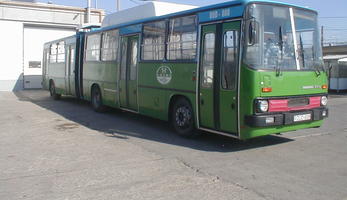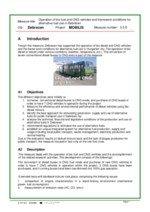Creating conditions for alternative fuel us in public transport
Summary
Seven public transport buses, running on conventional diesel, were converted to run on compressed natural gas (CNG) and biofuel in order to improve air quality in the city of Debrecen.
Implementing sustainable mobility
Debrecen is the second largest city in Hungary, the economic and trade centre of north-eastern Hungary. Before 2004, Debrecen did not have a transport plan and sustainability was not taken into account when decisions regarding transport were made.
The overall objective of this measure was to improve local air quality through establishing an integrated system for alternative fuel production, supply and
utilisation. In order to reach the project objectives, strong cooperation was established between the city’s mayor and the different transport stakeholders. The project comprised the setting up of framework conditions for alternative fuel use and dealt with the technical feasibility of using biogas and biodiesel in public transportation in order to establish a unique integrated system for alternative fuel production, supply and usage.
Progress
A study of the technical, financial and legislative parameters for using biodiesel and biogas in public transportation in Debrecen was carried out by the bus operator Hadju Volan, in cooperation with local experts. The University of Debrecen also carried out research into the availability of raw materials required for biofuel production and the technical conditions for development.
Hajdu Volan purchased three new Polish 100 percent CNG-operated buses and converted seven diesel buses from its fleet to run on CNG. The conversion included the purchase and installation of CNG engines and a CNG fuel tank, the reinforcement of the vehicle chassis, modifications to the vehicle electronics, testing, and state licensing.
Outcomes
The positive findings of the studies supported the full-fleet-scale usage of bio-fuels in the non-electric part of the public transport system in Debrecen, contributing to improvements in city-centre air quality.
This fact sheet has been updated by a third party on the basis of available information (not by the city itself), therefore we do not guarantee any data with respect to their content, completeness or up-to-dateness.








